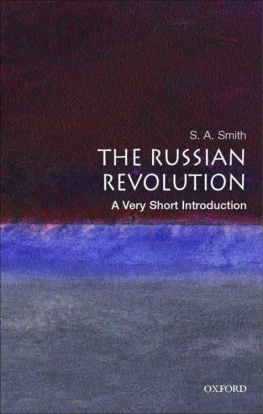ROUTLEDGE LIBRARY EDITIONS: THE RUSSIAN REVOLUTION
Volume 3
FROM AUTOCRACY TO BOLSHEVISM
FROM AUTOCRACY TO BOLSHEVISM
BARON P. GRAEVENITZ
First published in 1918 by George Allen & Unwin Ltd
This edition first published in 2017
by Routledge
2 Park Square, Milton Park, Abingdon, Oxon OX14 4RN
and by Routledge
711 Third Avenue, New York, NY 10017
Routledge is an imprint of the Taylor & Francis Group, an informa business
1918 Baron P. Graevenitz
All rights reserved. No part of this book may be reprinted or reproduced or utilised in any form or by any electronic, mechanical, or other means, now known or hereafter invented, including photocopying and recording, or in any information storage or retrieval system, without permission in writing from the publishers.
Trademark notice: Product or corporate names may be trademarks or registered trademarks, and are used only for identification and explanation without intent to infringe.
British Library Cataloguing in Publication Data
A catalogue record for this book is available from the British Library
ISBN: 978-1-138-21999-1 (Set)
ISBN: 978-1-315-31269-9 (Set) (ebk)
ISBN: 978-1-138-22522-0 (Volume 3) (hbk)
ISBN: 978-1-315-40050-1 (Volume 3) (ebk)
Publishers Note
The publisher has gone to great lengths to ensure the quality of this reprint but points out that some imperfections in the original copies may be apparent.
Disclaimer
The publisher has made every effort to trace copyright holders and would welcome correspondence from those they have been unable to trace.
FROM AUTOCRACY TO BOLSHEVISM
BY
BARON P. GRAEVENITZ
LONDON: GEORGE ALLEN & UNWIN, LTD.
RUSKIN HOUSE 40 MUSEUM STREET W.C. 1
First published in 1918
(All rights reserved)
IN this brief account of the events which gave rise to the Russian Revolution, and finally resulted in Russias political, economic, and military collapse, I have endeavoured to convey a correct idea of the ancien rgime as well as of what is now generally known by the name of Bolshevism. Though the rule of autocracy had failed to move with the times, and is in many ways to blame for the disaster which befell my unfortunate country, I have tried to explain to my readers that Russia is still in a state of development, in which the slightest exaggeration of democratic principles constitutes a danger. As yet it is impossible to predict Russias future. New facts alter the situation almost daily; some possibilities to which I alluded when I was completing the writing of this book in February 1918 have already materialized. We have witnessed the change from autocracy to Bolshevism, but now we can already feel certain that the political pendulum is reaching the limit of its swing and that it will presently begin to move in the contrary direction.
From Autocracy to Bolshevism
ALTHOUGH a great deal has been said and written in this country about the Russian Revolution, I do not think the majority of the British people has been able to form a correct idea as to what were the actual circumstances which led Russia up to this disastrous event and its even more disastrous consequences. It is by no means astonishing, although the Press has furnished much accurate information concerning the recent developments in Russia, that the true sequence of events is unknown to many. Russia differs greatly from the other States of Europe, and in order to understand her psychology one must possess some acquaintance with the historical influences which have affected social conditions, and with the state of affairs which existed in Court, military, and Government circles, as well as in the different classes of the population before and during this war.
The chief factor which retarded the development of Russia was the Tartar invasion (12381462). The struggle to free herself from these oppressors absorbed Russias energy, and for a long time prevented her becoming a strong and united State. When the Tartar rule had finally been shaken off, and the Tsars of Moscow had united the many small Russian principalities under their sceptre, Russia began to form the acquaintance of her Western neighbours, and to acquire mutual interests through the development of commerce. In the sixteenth century trade between Russia and England was in a flourishing condition. Nevertheless, Russia has in many respects remained far behind Western Europe.
The greatest effort to model Russia upon more advanced countries was made by Peter the Great (16891725). In the days when this monarch came to the throne the government was an absolute autocracy. The Russian nobility, or Boyars, had played a prominent part during the rule of the first Tsars of Moscow, but Ivan the Terrible (153384) had executed great numbers of them during his Reign of Terror, and from that time to the present day the Russian nobility has never played a really important part as an organized body. Peter the Great returned home after his stay in Holland and England, and proceeded to change the customs of his own country by force. Till then the women had been treated very much as in Eastern countries; they enjoyed practically no freedom, and were seldom shown to anybody outside their fathers and husbands houses. Peter ordered Assemblies to be held at his Court, at which his courtiers were forced to appear with their wives and daughters; men were made to shave their beards, and both sexes were compelled to dress in the European fashion of the day. Peter the Greats most interesting measure was the division of all his subjects into classes. Every one was classed either as a nobleman, a meshchanini.e. a townsmanor else a peasant. These were the three principal classes, but further subdivision was provided for. A meshchanin, for example, could have the dignity of a merchant or an honorary citizen conferred upon him. The idea of nobility acquired a much wider signification than is usual, and this dignity could be attained as a reward for services rendered to the State. The principal privilege of this class in those days consisted in the right to own land, with the peasants who lived upon it. Peters object, when granting nobility on this wide scale, was to encourage every man to give his services to the State. Any one who attained the rank of colonel in the Army, or a rank equivalent to that of a major-general in the Civil Service, which was also divided into ranks, became a hereditary noble. To encourage the nobility to serve, a law was passed which admitted to Court only those nobles, with their wives and daughters, who had attained equivalent rank in those services of the State which bestowed the dignity of noble. These laws, instituted by Peter the Great more than two hundred years ago, gave the Russian Court a bureaucratic character, and it is interesting to note that this system still survived, practically in its original form, in the days of Nicholas II. Latterly the nobility of each Province (Government) formed a Corporation, with an elected Marshal of Nobility at its head, and each subdivision of a Province (








